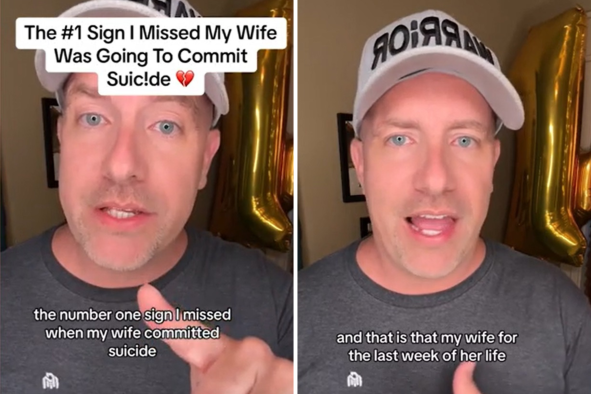Having seen her therapist for many years, Cara Lynch was used to discussing the intimate details of her life. However, following a breakup, even she was left stunned by the suggestion in her latest session.
Lynch trusts what he says and feels able to speak about anything that concerns her. However, she told Newsweek that she was left in total shock recently when her therapist said that the 36-year-old "might be gay" at the end of a session. She had never questioned her sexuality before, and yet, right when their time was up, her therapist dropped a major bombshell.
Lynch, from Northern Ireland but living in London, said: "I initially went to therapy over a bad breakup, so a lot of our sessions surround relationships, both platonic and romantic. As I date men, my sexuality hasn't really come up until recently.
"I have been attracted to women before, but I've never dated one. The idea that my entire dating history could potentially have been a lie is pretty mind-blowing. Also, the fact that I might not have known this about myself seemed crazy, too."
As much as therapists help clients learn about themselves on a deeper level and tackle conversations they might not be comfortable having elsewhere, sex and relationship therapist Leigh Norén told Newsweek it isn't best practice to bring up such major life changes at the end of a session.
Norén said: "Regardless of how well you know your client, you never know definitively how someone will take this kind of thing. It can produce all kinds of thoughts, feelings and questions, and if you're left alone to deal with them on your own, it can produce a lot of anxiety.
"Whether it's sharing thoughts about a client's sexual identity or possible mental-health diagnoses, you want to make sure this is delivered early on in session, so it can be unpacked and feelings can be tended to."
While Norén said that Lynch doesn't seem too perturbed by her therapist's statement, she says it is risky to identify any big changes when there isn't time to unpack it.
Norén added that clients may do it themselves at times as it "feels less daunting" at the end of a session, but therapists should usually avoid this behavior.
Now, more than ever, people are seeking out the help of a therapist to work through big changes, decisions, or stresses.
Back in 2004, it was reported that just 13 percent of U.S. adults had seen a mental-health professional. However, a Gallup poll in 2022 revealed that it was up to 23 percent. Younger adults and women were more likely than their counterparts to rate their mental health negatively, and in turn they were more likely to seek out mental-health care.
Data from the National Health Interview Surveys suggests that members of the LGBTQ+ community are more likely to see a mental-health professional than their heterosexual peers. Unfortunately, care isn't readily available for everyone; The Trevor Project highlights that 60 percent of LGBTQ+ youth who wanted it weren't able to get mental-health care.
How Did Social Media Help?
Seeing as her therapist made this life-changing suggestion as their session drew to a close, Lynch felt somewhat frustrated that they couldn't delve into it and unpack it. "I felt like he dropped a bomb, and I was just left in disbelief," she said.
They still haven't had another therapy session since this happened at the end of June, but she looks forward to seeing her therapist again soon and working out what this conclusion might mean for her.
Although she has been left deeply confused for the last couple of weeks, Lynch doesn't resent her therapist for saying it, and she is glad he could be so honest with her. They have worked together for many years, and she is positive that she can trust he is being transparent with her.
Lynch said: "It's taken me years to build this trust with my therapist, and I appreciate his open and honest opinion; that's what I pay him for. Whether I agree with him or not is a different story."
Seeing as she couldn't speak to her therapist about it, Lynch did what many of us find ourselves doing instead; she turned to social media for advice. On June 23, she posted a video on TikTok (@cynchmakes) explaining the conversation she'd just had, asking "am I gay now?"
The clip went viral with nearly 250,000 views and almost 20,000 likes on TikTok so far.
Lynch viewed it as a unique experience and she wanted to share it online, but to her surprise, she was able to connect with plenty of people who have found themselves in a similar situation.
"The reaction has been so positive, and it's really been overwhelming," Lynch said. "I had never heard anything like it and, honestly, I just thought it would make people laugh, but the comments on the video are just full of kindness and support. I should be so lucky to be a part of such an open and welcoming community."
In the weeks since sharing her video, Lynch has heard from many people who were told something similar by their therapists and wanted to offer their advice. Now, she has been left wondering if it is more common that she originally thought.
While she certainly wasn't expecting to generate this much attention online, Lynch was been heartened by the positive response she has received. With over 500 comments on the viral post, many people wanted to find out more about what happened, while others offered their advice.
One comment reads: "My previous therapist insinuated the same. Seeing a new one starting July, really curious now."
Another TikTok user wrote: "There has to me more context surely, but welcome! I'd say most of us had at least one jump scare like this."
A third person joked: "Imagine being so far in the closet that your therapist has to heave you out."
However, not everyone was on board with the idea, as one commenter responded: "I'm pretty sure gay isn't a diagnosis. Get [a] new therapist."
If you have a personal dilemma, let us know via life@newsweek.com. We can ask experts for advice on relationships, family, friends, money and work, and your story could be featured on Newsweek's "What Should I Do? section.
Disclaimer: The copyright of this article belongs to the original author. Reposting this article is solely for the purpose of information dissemination and does not constitute any investment advice. If there is any infringement, please contact us immediately. We will make corrections or deletions as necessary. Thank you.



